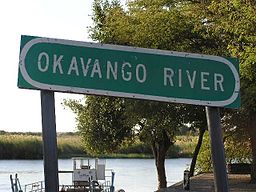Popa Falls
| Okavango | |
| River | |
|
Sign overlooking a ferry crossing on the Okavango from Botswana into Namibia
|
|
| Countries | Angola, Namibia, Botswana |
|---|---|
| Mouth | |
| - location | Moremi Game Reserve, Botswana |
| Length | 1,700 km (1,056 mi) |
| Basin | 530,000 km2 (204,634 sq mi) |
| Discharge | |
| - average | 475 m3/s (16,774 cu ft/s) |
| - max | 1,000 m3/s (35,315 cu ft/s) |
| - min | 350 m3/s (12,360 cu ft/s) |
|
Okavango river basin map
|
|
The Okavango River (formerly spelled Okovango or Okovanggo) is a river in southwest Africa. It is the fourth-longest river system in southern Africa, running southeastward for 1,600 km (990 mi). It begins in Angola, where it is known by the Portuguese name Rio Cubango. Further south, it forms part of the border between Angola and Namibia, and then flows into Botswana, draining into the Moremi Game Reserve.
Before it enters Botswana, the river drops 4 m in a series of rapids known as Popa Falls, visible when the river is low, as during the dry season.
Discharging to an endorheic basin, the Okavango does not have an outlet to the sea. Instead, it empties into a swamp in the Kalahari Desert, known as the Okavango Delta or Okavango Alluvial Fan. In the rainy season, an outflow to the Boteti River in turn seasonally discharges to the Makgadikgadi Pans, which features an expansive area of rainy-season wetland where tens of thousands of flamingos congregate each summer. Part of the river's flow fills Lake Ngami. Noted for its wildlife, the Okavango area contains Botswana's Moremi Game Reserve.
During colder periods in Earth's history, a part of the Kalahari was a massive lake, known as Lake Makgadikgadi. In this time, the Okavango would have been one of its largest tributaries.
Both Namibia and Botswana experience drought, and as a result, concerns have been expressed about possible conflict over use of the river's water. Namibia has built a water canal, measuring about 300 km long, and has proposed a project to build a 250-km pipeline to divert water from the river into Namibia to help relieve the drought.
Botswana, however, uses the Okavango Delta for both tourism income and a water source. The Department of Water Affairs in Botswana has submitted that 97% of the water in the river is lost through evaporation, so the country cannot afford to lose any extra water.
...
Wikipedia


